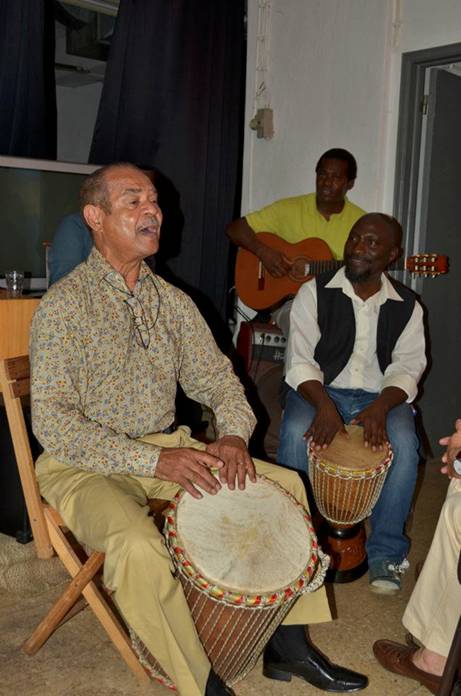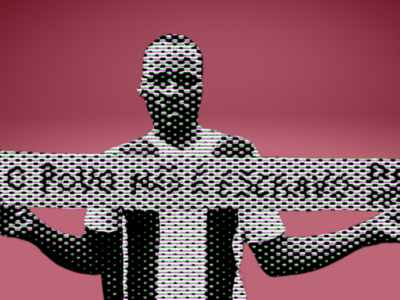On 24 May, 2012, Amnesty International reported that as the August elections in Angola approached, intimidation and violence against freedom of speech was expected to escalate, including that against political musicians. The report called for a full and impartial investigation into a violent attack against a group of anti-government activists, which included rapper Hexplosivo Mental.
Two weeks later, on June 11, another artist, known for his open opposition to the government, Luaty Beirão, also known as Ikonoklasta or Brigadeiro Mata Frakuxz, was arrested [pt] at the airport of Lisbon, for allegedly carrying cocaine in his luggage. On social media, many people commented that the real reason behind #Ikonoklasta‘s detention was political. In recent times, the rapper's voice of dissent has become more and more visible, as he openly lent support to the frequent street protests in Luanda where dissidents have been holding demonstrations to voice discontent with the government of President José Eduardo dos Santos, who has been in power for 33 years now.
Previously, Luaty had been arrested in March 2011, in a preemptive maneuver by the government which resulted in the cancellation of the proposed large-scale, anti-government demonstrations scheduled for March 7,2011. One year later he was attacked [pt] by pro-regime militias in Cazenga.
Time travelling to other ‘rhythms’ of resistance
In a journey to another time of Angolan music of resistance, the historical group N'Gola Ritmos from the 50's and 60's, was honored by the non-profit association Centro Interculturacidade [pt] in Lisbon, in the beginning of June, 2012. Celebrating the presence of Amadeu Amorim, one of the members of N'Gola Ritmos, blog Interculturacidade paid [pt] a tribute to the group, which was described as:

Gathering with Amadeu Amorim, a tribute to N'gola Ritmos at Centro InterculturaCidade. Photo by Jorge Joe Martins, Lisbon, June 2012 (used with permission)
motor da ideia de independência de Angola, e por isso perseguido. desmantelado e com vários dos seus elementos presos. Amadeu esteve longo tempo no Tarrafal e mais tempo esteve o líder do conjunto, Carlos Liceu Vieira Dias.
In an interview published [pt] on the blog Nós Por Cá, by Silvia Milonga in 2002, Amadeu Amorim explained “what N’gola Ritmos stood for in the social and political context” back then:
No fundo, era uma rebelião pacífica, tentando despertar consciências adormecidas, que não acreditavam em mais nada, eram 500 anos de colonização. Não havia televisão, nem rádio para toda gente, os jornais não chegavam aos musseques nem ao interior do país e nós sabíamos que uma canção ficava presa no assobio, no cantar. Na LNA quando cantávamos em kimbundu, as pessoas viravam a cara meias envergonhadas, chamavam-nos os mussequeiros. Algumas pessoas no meio daquela malta que estavam acordadas, entediam porque cantávamos em kimbundu, mais tarde outros apareceram a dizer que falavam ou cantavam em kimbundu. Chegamos a rádio Esperança, uma rádio que transmitia de Brazaville, ouvida às escondidas. A nossa canção era a única que existia, as pessoas ouviam a rádio e o N’gola Ritmos, passando a mensagem de que não chegamos ao fim, vamos começar agora.
The following video of the song N'zagi illustrates life in Angola back in the 1960s-70s:
Pioneers of the musical genre Semba, N’gola Ritmos introduced in their popular songs, messages of “absolute claim”, which ended up leading the group to a “death before time”, as Amadeu said in the interview:
Tudo culmina com a prisão porque alguns de nós estávamos directamente metidos na luta política (…)
Depois de regressarmos da cadeia, eu e o Liceu tínhamos que nos apresentar de 15 em 15 dias à polícia e estávamos proibidos de fazer intervenções públicas; depois, veio a guerra e estivemos muitos anos com o recolher obrigatório, não se podia andar a noite.
It all culminated in the prison, because some of us were directly involved in the political struggle (…)
After we came out from the prison, me and Liceu had to present ourselves to the police every fortnight and we were forbidden to make public performances; afterwards, the war came and we were under curfew for several years; we couldn't go out at night.
Nowadays, despite the rhythms being different, there appear to be similarities with regard to the persecution of politically motivated artists in Angola.
Commenting on Luaty's detention, writer José Eduardo Agualusa wrote [pt] on his Facebook profile:
todos os que lutam pela democracia em Angola são neste momento alvos a abater – e, pelo que se vê, vale tudo.
The blog Central Angola 7311 published [pt] a note recalling that Luaty
não tem quaisquer antecedentes, sem ser os que têm acompanhado no último ano: Ativismo pacifista.
Como tantos outros em Luanda, tem sido perseguido física, social e politicamente, como têm testemunhado.
Like many others in Luanda, he is being physically, socially and politically chased, as you have witnessed.
On the evening of June 12, 2012, Luaty was released from custody by the Portuguese police, reported Maka Angola, and added that “while the investigations continue, the rapper, who has dual citizenship, including the Portuguese, must report to the police, if he is to be absent from the country for more than five days”.








3 comments